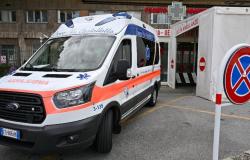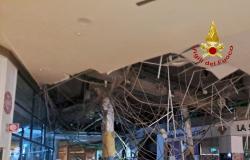FROM OUR CORRESPONDENT
GENOA – The best time is at sunset. There is always someone who places the chair in front of the enormous grate that shows the checkered sky and enjoys the view. If that barrier weren’t there, it would look like a hanging garden overlooking the Gulf of Genoa. A panorama that has the flavor of freedom. Perhaps this is why it is one of the most coveted corners. «When we were forced to darken the fence for a period, our guests were more intractable than usual», admits the health director Paolo Rossi. Strange to say but Villa Caterina, on the Genova Prà hill, hosts a Rems, the residences for the execution of security measures, established with law 81 of 2014 which put an end to the shame of judicial psychiatric hospitals. Here come people convicted or awaiting trial with evidence of mental infirmity or semi-infirmity. The law defines them as “interned”, but at Villa Caterina the term is banned. We prefer to call them “guests”.
There are currently twenty. Exactly how many the law requires for each Rems. All accused of crimes of various kinds and seriousness. Among them a “famous” guest: Luca Delfino, the “girlfriend killer” who after 16 years in prison for the murder of Antonella Multari will have to spend another 6 and a half in Rems.
Just upon his arrival it was necessary to darken the enormous grate, in order to face the onslaught of photographers and videographers. Not to mention the residents who started collecting signatures, worried about their safety. Delfino has been here for nine months now and, for the first time since his arrival, Villa Caterina opens its doors to us.
From a small room, which houses the infirmary, you enter an open space. A large open space where practically all communal life takes place during the day. In one corner the refectory, further away tables and chairs for meetings and activities such as cooking and ceramics courses, and near the stairs a small recreational area, with a ping pong table and table football. However, access to the sleeping area is prohibited: single or double rooms, all with personal bathroom.
In the lounge with large windows, it’s almost time for lunch and the eye immediately goes hunting for the “girlfriend killer”. No way. «There’s no point in looking – jokes the medical director -, Delfino is in his room. At the beginning he was almost always locked in his room, in the company of his radio. A few months ago he began to socialize and participate in our activities.” He has a single room, where he brought a small fridge with him. «He is well aware of his notoriety – says Rossi –, but to date he has never caused any problems».
In the hall many young people and many foreigners. «At the moment we have an average age of 35 and 35% are not Italian. In general, the female presence is scarce.” A black boy watches warily. He has a physical prowess that does not go unnoticed, especially when he approaches and points at a nurse: «I have to talk to you!». He doesn’t add anything else.
He advances towards the door that leads to the infirmary and attempts to enter. «Not now – they reassure him -. We have a meeting. As soon as we finish.” «In fact it is a particular subject, also due to its size. Once, two of us struggled to stop him”, sighs the nurse.
In any case, no cells and rattling of locks. “This is neither a prison nor a judicial psychiatric hospital,” the medical director is keen to point out. Rems is managed by the Redancia company, led by the psychiatrist Giovanni Giusto, who also operates in other communities for psychiatric patients. «Unfortunately, not everyone interprets the Rems in the same way – explains Professor Giusto -. For some there are still places of detention and even physically they have remained in the same locations as the old Opg”.
Here, however, you can really feel the spirit of the communities. Starting from the approach of the 35 operators who work there: «We focus everything on care and treatment. We don’t have holding rooms and only in extreme cases do we resort to Tso. But in the last few months we have only done two, to the same person with a serious psychotic decompensation.” Physical places are one of the distinctive features of Villa Caterina. «This structure – explains Giusto – was built precisely to accommodate psychiatric patients. And this affects the treatment: the cared for space is part of the treatment.”
This is why until the evening the “guests” they are free to move in all common spaces. They can watch TV and read newspapers, but the internet and cell phones are absolutely forbidden. «Delfino is among the most attentive to what happens outside – explains Rossi -. He follows TV, especially when they talk about him. We also told him that a journalist would be coming. If he had found out later he wouldn’t have taken it well.” Family visits are allowed once a month. You can also take advantage of hourly licenses: «Authorized by the supervisory judge, guests leave, accompanied by our staff, for small personal tasks”.
The fact that it is not a place of detention does not mean anything that there are no safety problems. A few weeks ago, due to an argument, the intervention of the police was necessary. And then there were also attempts to escape. Yet the law does not provide for the presence of prison guards or law enforcement. As a result, almost all Rems use private security services. «We are doctors and, even if we wanted to, we wouldn’t know how to do anything else – says Giusto -. And in any case, in difficult moments we can trust in Professor Boè’s help.” He opens the door and lets a Golden Retriever in: «Meet my colleague Boé!». Sorry, let me understand. «He has great emotional intelligence, useful for absorbing aggression». And it would have been decisive in the treatment of some particularly difficult guests.
«We had a 21-year-old – says the director of Rems, Monica Carnovale – that when he was in crisis he broke everything: furnishings, furniture and even walls. One day when we no longer knew how to handle it, he calmed down only with Boè. Little by little the dog began to lick it and the boy began to caress it. Until they lay down on the ground, next to each other.”
For many, Villa Caterina is a “splendid anomaly” in the panorama of the 30 Italian Rems which, instead, are faced with a chronic shortage of places. At least 700 inmates on the waiting list. And in some cases it arrives too late. A month ago, a young man who was on the waiting list to enter Rems committed suicide in Turin prison. The latest in a long series, which pushes many to ask for the maximum number of internees to be increased to 20.
«Law 81 was a turning point of civilization – reflects Professor Giusto -, but unfortunately there are also those who have ended up thinking they have solved the problem by simply replacing prison with Rems. Furthermore, the fact that they depend on the Ministry of Health has led to their “regionalization”. And so from one corner of Italy to another, the approach to treatment changes greatly.”
There is also the problem of promiscuity. “In Rems we have people accused of very serious crimes, such as sexual assault and murder, together with those who have committed minor crimes.” And then, not all psychiatric patients are the same. «There are subjects that are more or less treatable, but there is a hard core for which only custody can be operated – explains the health director of Villa Caterina -. Probably many of these could stay in prison, as long as they live in dignified conditions.” But mental health in Italian prisons is a denied right. Although there are six thousand prisoners who have shown psychiatric disorders, in 2022, according to the Antigone Report, only 247 were guaranteed psychiatric assistance and treatment.





